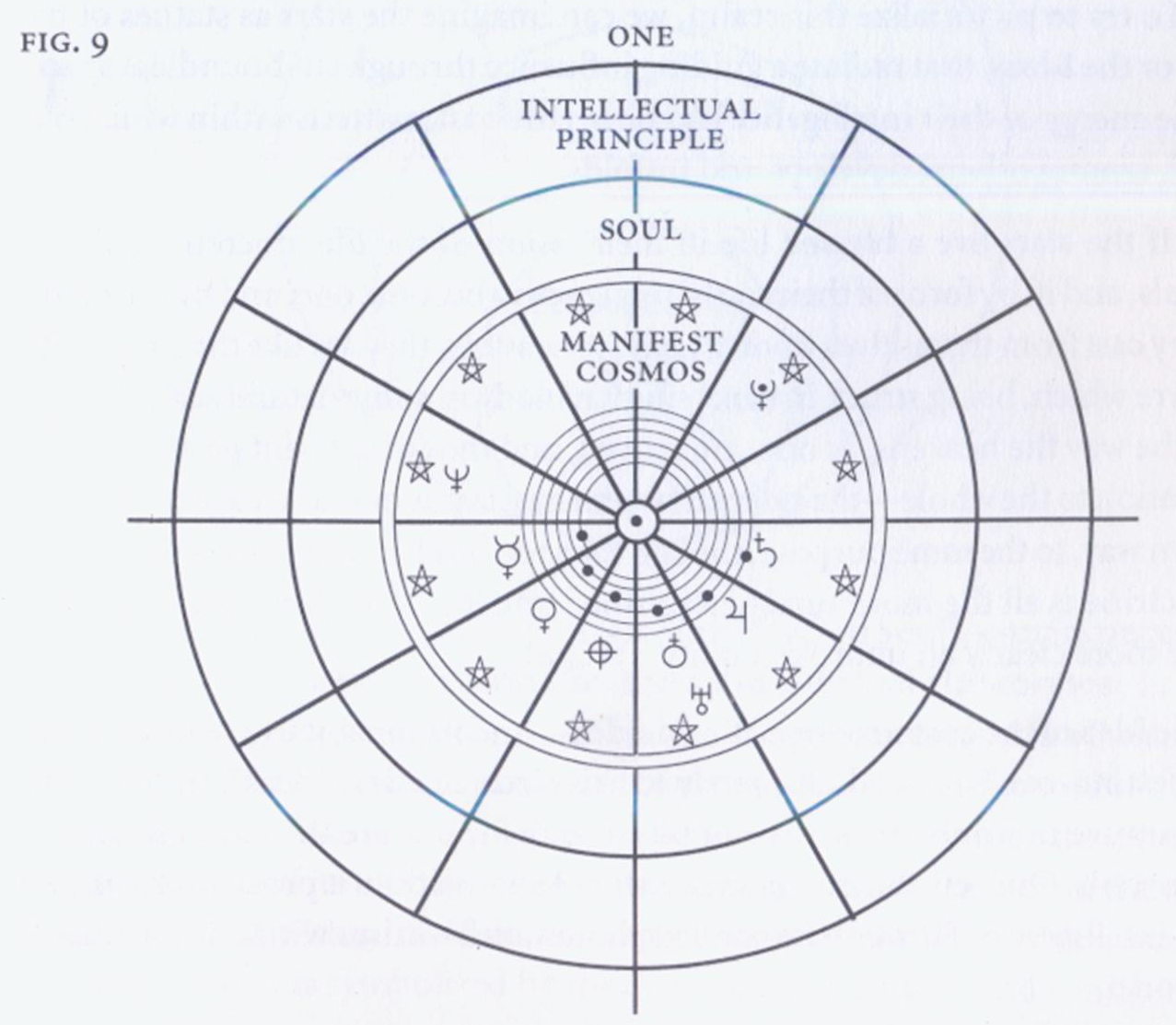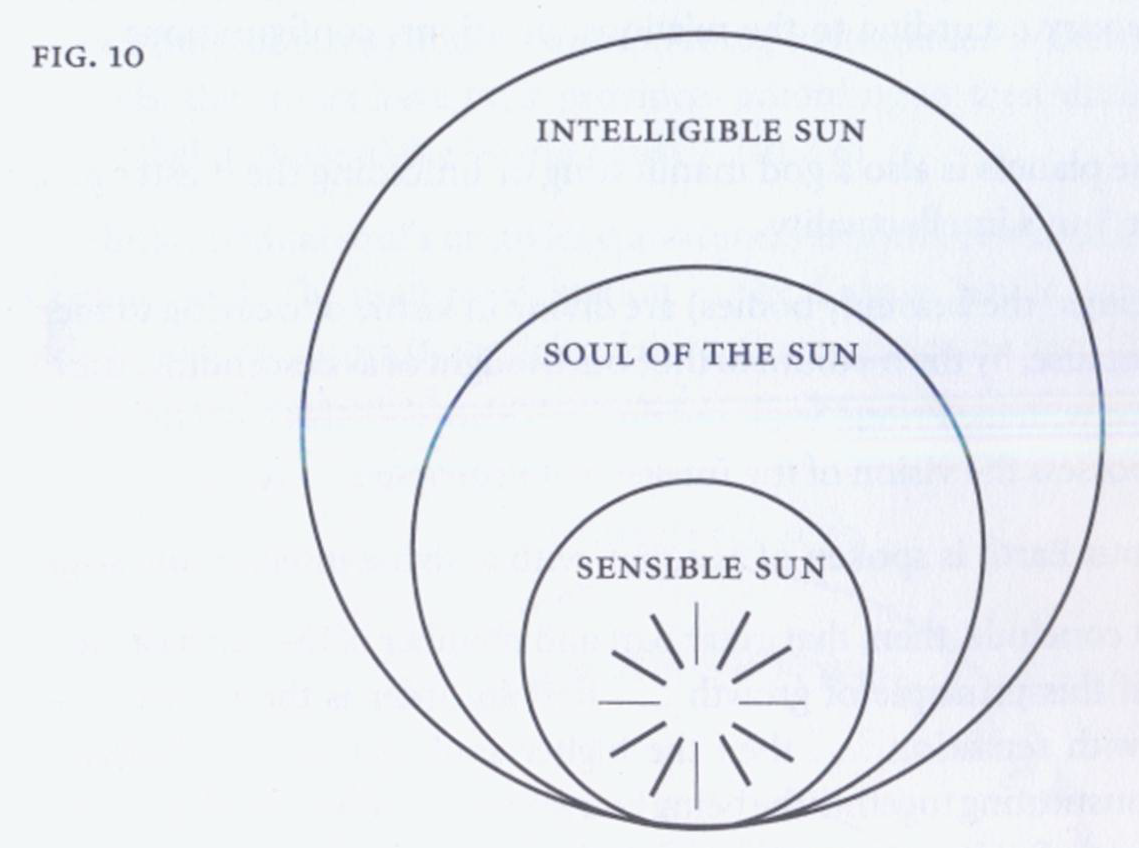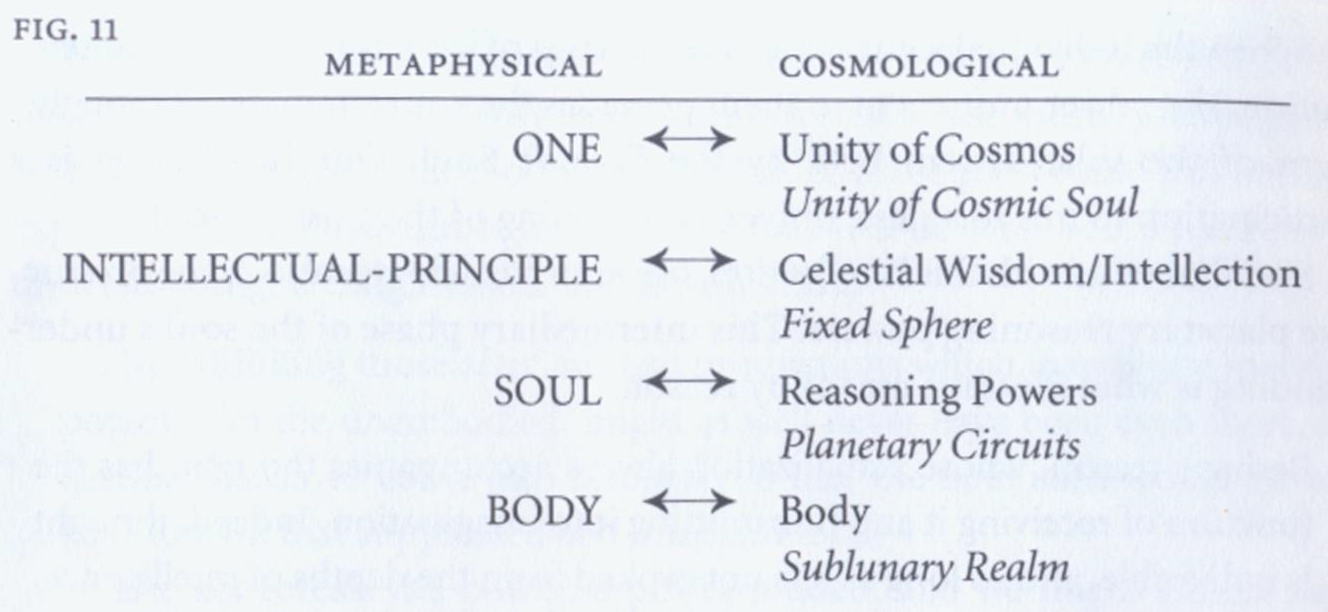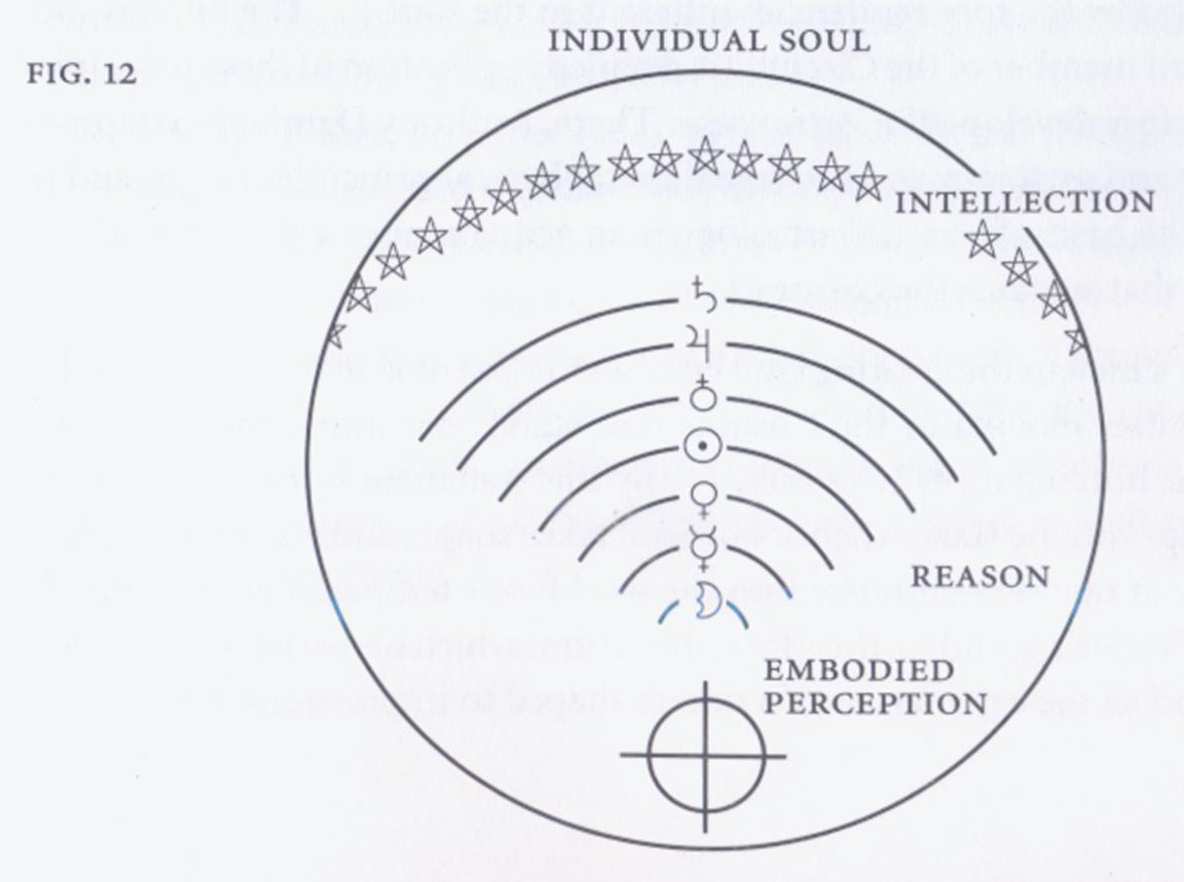Página inicial > Antiguidade > Neoplatonismo (245-529 dC) > Plotino (séc. III) > Damiani (Enneads:731-737) – The System of Nature
 Damiani (Enneads:731-737) – The System of Nature
Damiani (Enneads:731-737) – The System of Nature
quinta-feira 14 de setembro de 2023, por
The entire universe, including all levels and all possible worlds, is the body of God manifested within Soul. For Plotinus , this is the system of Nature. Our universe as thus conceived is not inert matter, nor is it an illusion:
... this All is one universally comprehensive living being, encircling all the living beings within it, and having a soul, one soul, which extends to all its members in the degree of participant membership held by each... (IV.4.32)
For Plotinus, the Cosmos is not only an image of divinity, but also the presence of divinity. The primal principles are immanent in and for the system of Nature. In successive order: while the One “is nowhere, nowhere is it not” (V.5.8); Intellectual-Principle communicates the Reason-Principle of the Universe (III.2.2); Soul is said to be “the author of all living things” (V.1.2). And in III.8.4, Nature herself says: “I gaze and the figures of the material world take being as if they fell from my contemplation.”
In sum: the loveliness that is in the sense-realm is an index of the nobleness of the Intellectual sphere, displaying its power and its goodness alike: and all things are for ever linked; the one order Intellectual in its being, the other of sense; one self-existent, the other eternally taking its being by participation in that first, and to the full of its power reproducing the Intellectual nature. (IV.8.6)
Our hope is that we will be led to a superior understanding, or rather to a qualitatively different kind of understanding of our being here—an understanding that does not sidestep or deny the anomaly of sense perception, but, rather, reveals something of the meaning implicit in the orderly and evolving transformation that our minds and bodies undergo. In short, we are going to enter sympathetically into an analysis of experience as conceived by some of the ancient philosophers. We will try to understand and appreciate the philosophic insight which they summarized in the dictum: “The world is full of Gods.”
To unfold this vision of the cosmos, we begin with the “Reason-Principle” or Idea of the Universe in the mind of the Demiurge, as the background within which a hierarchy of souls will manifest a cosmos.
All living things, then—all in the heavens and all elsewhere—fall under the general Reason-Principle of the All... (II.3.13)
To try to pictorialize this realm, we can imagine the stars as statues of the gods, or the Ideas, that radiate a guiding influence throughout boundless space. ... The energy of their intelligence lays down the basic pattern within which our world, among others, develops and unfolds.
If the stars live a blessed life in their vision of the life inherent in their souls, and if, by force of their souls’ tendency to become one, and by the light they cast from themselves upon the entire heavens, they are like the strings of a lyre which, being struck in tune, sing a melody in some natural scale: if this is the way the heavens, as one, are moved, and the component parts in their relation to the whole—the sidereal system moving as one, and each part in its own way, to the same purpose, though each too hold its own place—then our doctrine is all the more surely established; the life of the heavenly bodies is the more clearly an unbroken unity. (IV.4.8)
The Idea of the cosmos—the World-Idea—and its inhabitants, evolving and manifesting, can be traced ultimately to this circle of stars (Ideas). In this view, the stars are not only the source of physical light, but are the embodiment of divine souls. Our sensible sun is such a star. As a unit Soul it proceeds to unfold a vast intelligence. Through its contemplation, there arises within it the Idea of the world.
IV.3.11 brings a Himalayan panorama into view:
The sun of that sphere—let us return to it as our example—is an Intellectual-Principle, and immediately upon it follows the Soul depending from it, stationary Soul from stationary Intelligence. But the Soul borders also upon the sun of this sphere, and becomes the medium by which it is linked to the over-world; it plays the part of an interpreter between what emanates from that sun down to this lower, and what rises—as far as, through Soul, anything can—from the lower to the higher. (IV.3.11)
The “sun of that sphere” is the Intellectual-Principle, the Ideas shining in the intelligible world, inseparable from the “stationary Soul”—which is the Absolute Soul. But “the Soul borders also upon the sun of this sphere”—soul is not of a nature to be in the Noûs only. Soul, as emanating from the Divine Mind, is present with the entire world it manifests within itself. Cosmic Soul is the unbroken link, the eternal continuity of Being and Becoming. For Plotinus, the Soul of the sun is the God of our solar system.
Behind the visible sun is the Cosmic Soul [the Sun Soul]—an inconceivable immaterial boundless light and life, the substratum of the cosmos. . . . The infinite life-intelligence of the Sun Soul is interpenetrating with all the other [star] souls. Through their mutual omnipresence, each cosmic soul’s intellection or contemplation constitutes its World-Idea. . . . When the Sun Soul interprets to itself its infinite inner vision, through its own universal reasoning, it brings about within itself an archetypal form of the World-Idea. . . . This celestial wisdom is symbolized by the Sun’s sidereal zodiac, and constitutes its intellectuality [“Ideal-Forms ... unrolled and separate” (I.1.8)].... Symbolically, the Sun’s travel through the cosmos represents to us the universal reasoning through which our Sun too is assimilating facets of the unfathomable divinity of Nous. [Note the parallel of this passage to the sixth book of the Republic , where Plato bases his grand epistemology on an analogy between the sensible sun with its light, and the Idea of the Good—the “intelligible sun”— author of being and knowing.]
In sum, this infinite light, the soul of the sun, is a principle of consciousness and intelligence which thinks the world into existence. Together with the living system of planetary souls, our sun unfolds its World-Idea as the solar system (which Plotinus refers to as the Cosmos, and the “circuit”).
... the entire Cosmos puts its entire life into act, moving its major members with its own action and unceasingly setting them in new positions; by the relations thus established, of these members to each other and to the whole, and by the different figures they make together, the minor members in turn are brought under the system as in the movements of some one living being, so that they vary according to the relations, positions, configurations . . . (IV.4.33)
Each of the planets is also a god manifesting or unfolding the master plan inherent in the Sun’s intellectuality.
These Beings (the heavenly bodies) are divine in virtue of cleaving to the Supreme, because, by the medium of the Soul thought of as descending, they remain linked with the Primal Soul, and through it are veritably what they are called and possess the vision of the Intellectual Principle... (IV.3.11)
In particular, our Earth is spoken of as a god, with a divine intellect and soul.
We must conclude, then, that every part and member of the earth carries its vestige of this principle of growth . . . next in order is the nature . . . concerned with sensation . . . then the higher soul and the Intellectual-Principle, constituting together the being known as Hestia (Earth-Mind) and Demeter (Earth-Soul)—a nomenclature indicating the human intuition of these truths ... (IV.4.27)
Through the bodies it mysteriously fashions for us, our earth provides the world-image appropriate for the human souls inhabiting it.
This encompassing view of the cosmos as an unfolding of the World-Idea provides the epistemological background needed to understand how Plotinus sees the arisal of knowledge for the individual human entity. We summarize the levels within the cosmos by drawing a parallel to the fourfold metaphysical principles.
Tractate III.4.6 emphasizes the immense scope of the individual Soul or mind and its intimate relation to the cosmos.
We must understand that, while our souls do contain an Intellectual Cosmos, they also contain a subordination of various forms like that of the Cosmic Soul. The World Soul is distributed so as to produce the fixed sphere and the planetary circuits corresponding to its graded powers: so with our souls; they must have their provinces according to their different powers, parallel to those of the World Soul... (III.4.6)
The individual soul’s undivided awareness is omnipresent as a unity with the Cosmic Soul. Through participation in the Cosmic Soul’s powers, the individual soul or mind is modalized into three grades of life: life intellectual, rational, and embodied—represented respectively by the starry sphere, planetary spheres, and sublunar sphere.
When the individual souls remain at the level of the Cosmic Soul’s contemplation, the power immanent in them pervades the entire archetypal thought-form of the solar system held by the Cosmic Soul. Our Intellection is a participation in this formless, universal reasoning of the Cosmic Soul.
Simultaneous with this Intellection, our soul participates also in the productive planetary reasoning powers. This intermediary phase of the soul’s understanding is what Plotinus means by reason.
Perhaps reason, whose actualization always accompanies thought, has the function of receiving it and transmitting it to imagination. Indeed, thought is indivisible, and so long as it is not evoked from the depths of intelligence, it remains as it were hidden within it. (IV.3.30, Guthrie transl., p. 437)
Because of its desire for embodiment or experience—the complete differentiation of thought—soul presides over successive embodiments on this planet, shining its light and power into the psychosomatic organism, the Animate. Ego subjectivity emerges.
... from the organized body and something else, let us say a light, which the Soul gives forth from itself, it forms a distinct Principle, the Animate; and in this Principle are vested Sense-Perception and all the other experiences found to belong to the Animate.... We are not separate from the Animate so constituted, even though certainly other and nobler elements go to make up the entire many-sided nature of Man. (I.1.7)
The entrance of the soul into the world, to associate with a particular body, is determined by the root tendencies inherent in the soul ... The human soul is now a fated member of the Circuit. [A detailed application of these principles to human life is developed in Astronoesis . There, Anthony Damiani juxtaposes philosophy and astrology so as to reveal metaphysical principles in act, and to show that the basis of classical astrology is an acquaintance with the wisdom-knowledge that sustains the cosmos.]
In the Timaeus the creating God bestows the essential of the Soul, but it is the divinities moving in the Cosmos (the stars) that infuse the powerful affections holding from Necessity.... By this statement our personality is bound up with the stars, whence our Soul takes shape; and we are set under necessity at our very entrance into the world: our temperament will be of the stars’ ordering, and so, therefore, the actions which derive from temperament, and all the experiences of a nature shaped to impressions. (II.3.9)
Having explained the process of embodiment and the experience of the sensible world, Plotinus shows us that the purpose of the journey through the cosmic circuit is to acquire some good. What possible good could this be? The experiences provided through many lifetimes will develop soul’s faculties of understanding, feeling, reason, and imagination.
... by exhibiting those activities and productions which, remaining merely potential in the unembodied, might as well never have been even there, if destined never to come into actuality, so that the Soul itself would never have known that suppressed and inhibited total.The act reveals the power, a power hidden, and we might almost say obliterated or non-existent, unless at some moment it became effective: in the world as it is, the richness of the outer stirs us all to the wonder of the inner whose greatness is displayed in acts so splendid, (IV.8.5)
Ultimately, the purpose is the acquisition of Ideas by the mind, to complete the vision resident in the logos.
Action, thus, is set towards contemplation and an object of contemplation, so that even those whose life is in doing have seeing as their object; what they have not been able to achieve by the direct path, they hope to come at by the circuit ...Hence the Reason-Principle must not be left to lie outside, but must be made one identical thing with the Soul of the novice so that he finds it really his own. (III.8.6)
So it is rather a straightforward affair to discern that the purpose of all this activity is to ultimately possess the object of contemplation, the ideas or reason-principles that are being manifested by life.
Soul incarnates or participates in the ideas of the planetary mind by perceiving the world and experiencing through a body what the gods think. Thus Earth—footstool of the Gods—nurses our soul to heavenly maturity and humanity. What is becoming explicit in this exegesis is a theory of the endless evolution of the content of an individual soul’s awareness. Through reasoning on the content of the World-Idea which it is manifesting, the soul evolves its understanding until intellection becomes predominant, and this is brought to bear on its own self-nature. If the inquiry is pursued, this process will result in intrinsic self-awareness.
Ver online : Anthony Damiani
 PhiloSophia
PhiloSophia


